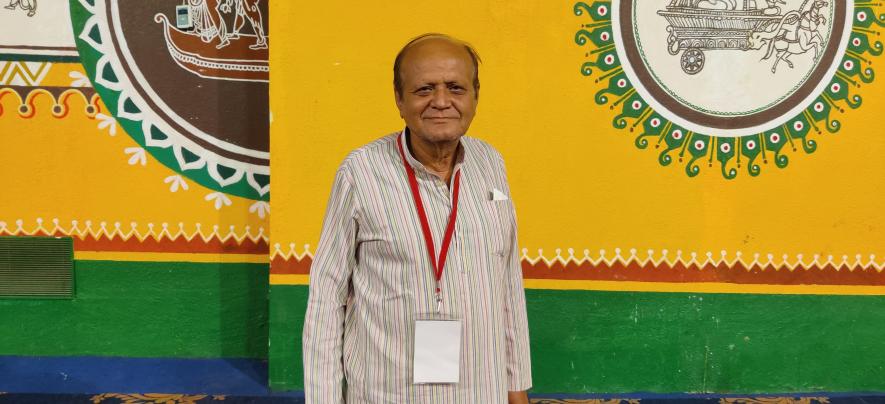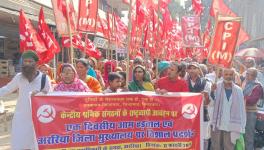Govt Hinders Workers’ Struggles by Unleashing Police or Dividing Working Class: Arun Mehta

Arun mehta
The 17th All India Centre of Indian Trade Unions conference is underway in Bengaluru from January 18-22. Over 1,500 delegates from across the country have gathered in Palace Grounds to discuss ways to improve the organisation as well as the trade union movement in India. For several years, the 'Gujarat model' has been a much-hyped and highly marketed development paradigm. Labour activists, however, have called the bluff and pointed out the human cost of the state's industrial policy.
NewsClick caught up with the general secretary of the Gujarat unit of CITU, Arun Mehta, who elaborated on the perilous situation of workers, especially in the post-covid scenario.
NC: What are the issues faced by the workers in Gujarat?
Mehta: Even before 2002, there has been a nexus of corporate and communal forces in Gujarat. In the past, Gujarat did not have a contract labour system. Since the time Narendra Modi was the chief minister, Gujarat has had the greatest number of contract employees working both in the government as well as other public sector units. The government has filled up at least 60% of posts through contractors. This includes teachers, doctors, nurses, secretaries, and even clerks.
NC: Did this policy continue in the election year as well?
Mehta: Last year, they announced vacancies in 13 departments because it was an election year. The exams were to be held for recruitment. However, all 13 papers were leaked and the exams could not be held. And it later emerged that at least six papers were leaked by BJP leaders. This was not exposed by agencies; it was exposed by the press. This is the situation faced by educated youth. The situation of workers is much worse.
NC: How difficult is it for workers to navigate the obstacles and organise in Gujarat?
Mehta: In 2006, the government told business owners that they needed to give a self-declaration to the labour department (regarding labour law compliances). Once this is done, no inspections will be carried out for a period of one year. If there are complaints against any factory, the factory inspectors have to seek permission from the labour commissioner in order to investigate the claims. Further, the labour machinery itself has been dismantled. For the last 10 years, more than 70% of the posts in the labour department have remained vacant. Earlier, there were 12 labour officers in one district. Now there is either one officer per district or there is a common labour officer for two districts. There should be at least 32 assistant labour commissioners. However, today there are only five. One commissioner oversees 4-5 districts. So, when we want to file a complaint, the commissioner says that he can visit the location only after one or two months.
NC: Gujarat has been receiving the highest share of the FDI (foreign direct investment). What makes it a preferred state?
Mehta: During the Covid-19 pandemic, the Gujarat government had changed the factory shift timings to twelve hours (this was later struck down by the Supreme Court). Overtime pay was cancelled. They brought amendments to the Industrial Disputes Act and removed the clause which required permission from the government for employee retrenchments. If foreign capital or new investment comes in, labour laws do not apply for a period of three years. So, in such a situation, why will the investment not come in? The new industries being set up here are highly technical in nature. So, employment has not increased by a big margin. Further, there are 4 lakh educated unemployed youths who have registered with employment exchanges.
NC: What was the effect of the pandemic on the industries?
Mehta: At least 30% of existing industries may have shut down operations. The once vibrant textile industry in Surat is going through a bad phase and many units have been shut down here leading to an unemployment crisis. The government is now giving factory owners an opportunity to loot and exploit those who are desperate for jobs. Last year, we sent 25 applications to the police commissioner for permission to hold labour demonstrations. All were rejected. You cannot hold demonstrations anywhere in Gujarat because Section 144 has been continuously applied for the last three years. Section 144 has to be applied only if there is a riot or some law and order situation. This is being misused to prevent labour agitations. The courts have also refused to intervene. However, if the BJP wants to take out rallies, they don’t have any problem getting permission. Even Bajrang Dal has held rallies in Gujarat.
NC: Have there been any efforts to communalise the working class?
Mehta: The communal forces are partly in place to help the corporate agenda. When there is exploitation, there will be a protest from the workers. There are two ways to stop this – either you unleash the police and stop the protest in an authoritarian manner, or you divide the working class. The Gujarat model is a nexus of corporate and communal powers. The Bajrang Dal works in bastis and tries to influence the masses. Indian history has seen both colonialism and Mughal rule; so, their propaganda is built around this. The earlier religious feeling was innocent. Now, the BJP and other communal forces have injected hate into religion. On the basis of religious and caste hatred, we see the rule of monopoly capital.
NC: Gujarat then seems to be a tough terrain for workers’ mobilisations. What has CITU’s experience been like, in this context?
Mehta: There are 29 CITU-affiliated unions here, of which the union of Anganwadi workers is the largest. The union of Asha workers is also quite large, but the labour department has not registered this union for the last three years. We are forced to fight without registration. In September, we conducted a three-day strike for wage revision of Anganwadi workers. Because it was an election year, four Cabinet ministers and the chief secretary, Kailashnathan – a favourite of Narendra Modi – also came to meet us and negotiate. Finally, they agreed to a wage revision from Rs 7,800 per month to Rs 10,000 per month. Moreover, during the pandemic, the police had lathi-charged the migrant workers who were trying to get back home. They were not provided food either by their employers or the state government. We came to the streets and protested. After 10 days, the government started the Shramik train facility for migrants.
Get the latest reports & analysis with people's perspective on Protests, movements & deep analytical videos, discussions of the current affairs in your Telegram app. Subscribe to NewsClick's Telegram channel & get Real-Time updates on stories, as they get published on our website.
























